七年级英语第7讲-7BU7-82023年安徽中考英语中考综合复习-教案
文档属性
| 名称 | 七年级英语第7讲-7BU7-82023年安徽中考英语中考综合复习-教案 |
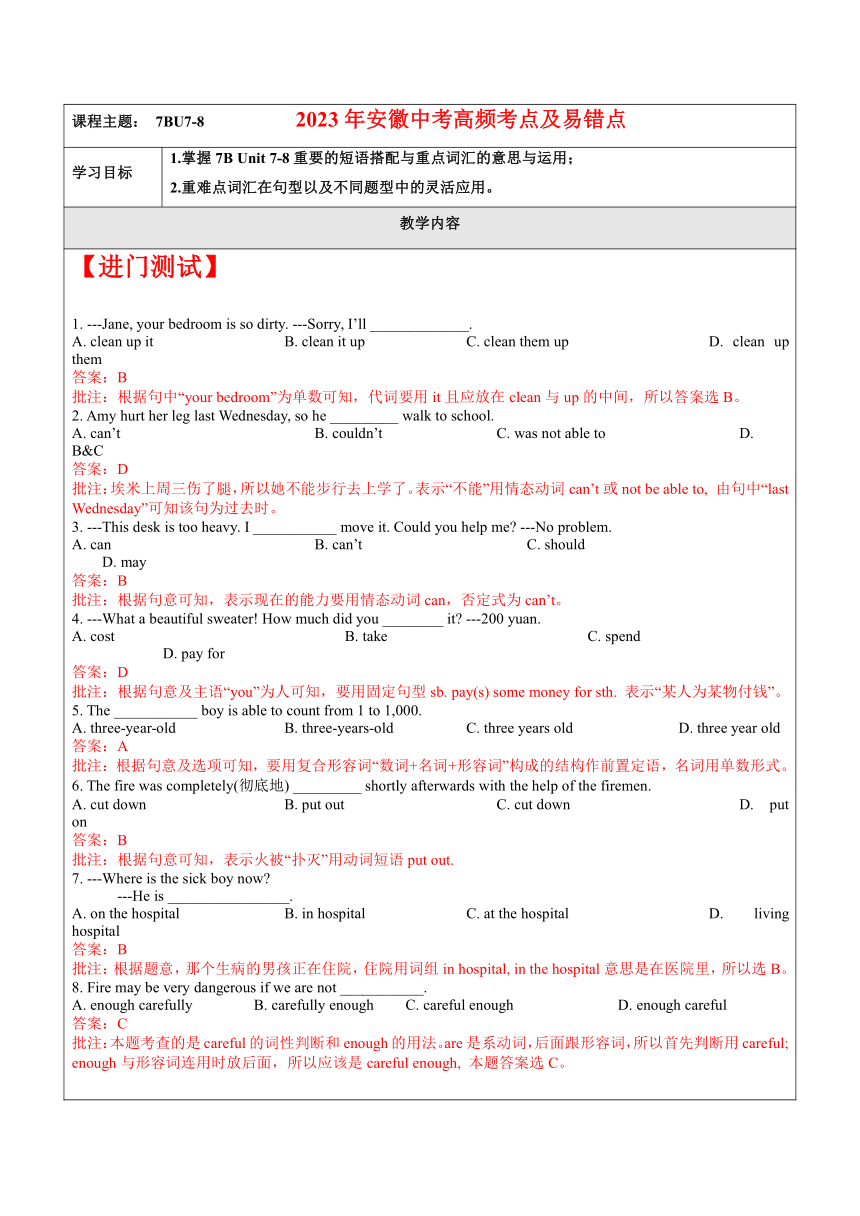
|
|
| 格式 | zip | ||
| 文件大小 | 68.2KB | ||
| 资源类型 | 教案 | ||
| 版本资源 | 通用版 | ||
| 科目 | 英语 | ||
| 更新时间 | 2023-04-13 07:16:19 | ||
图片预览

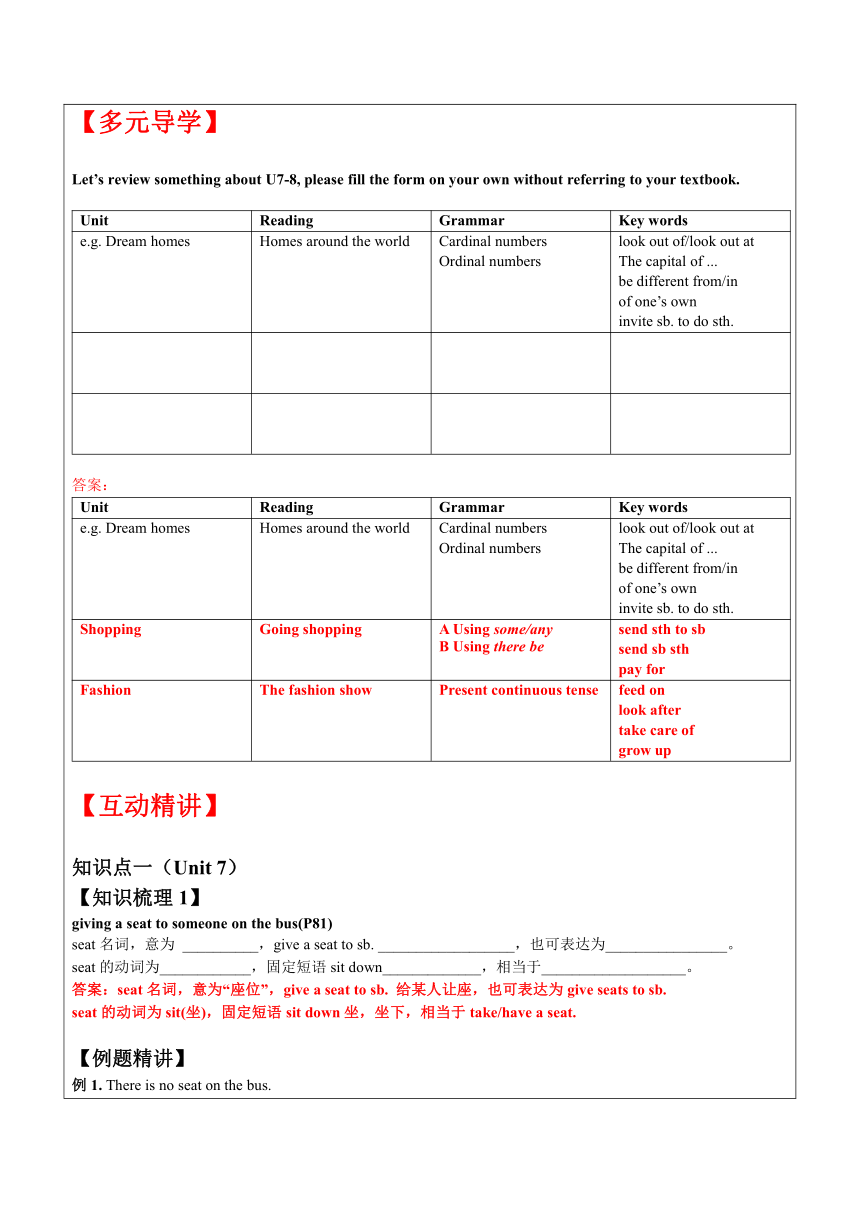
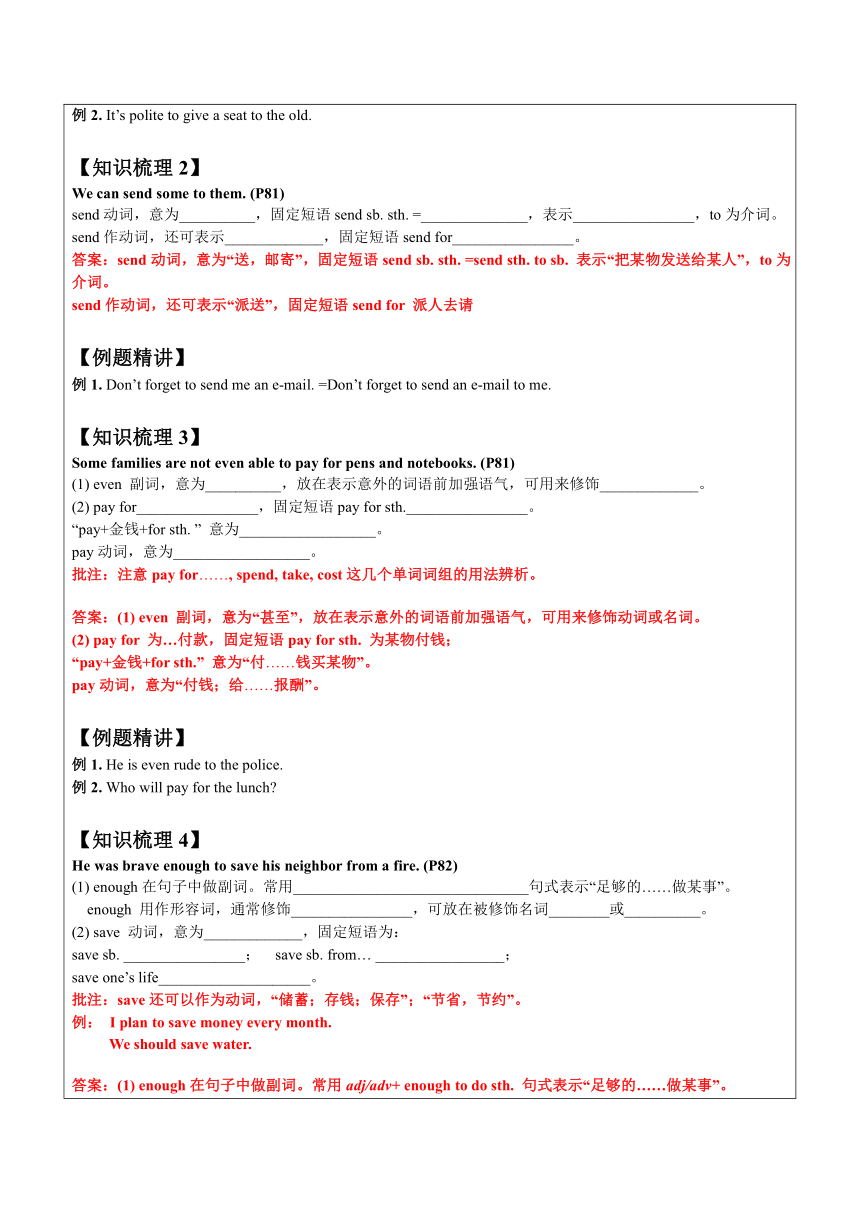
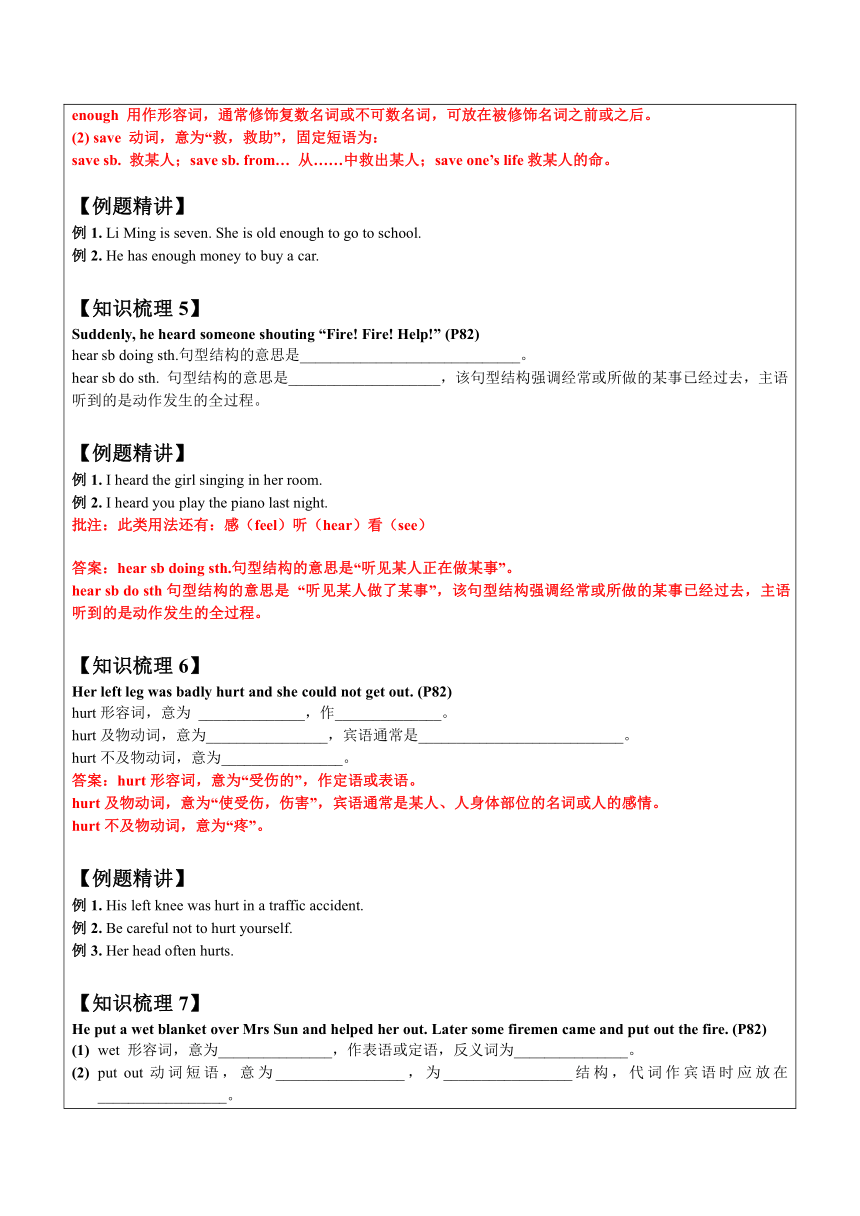
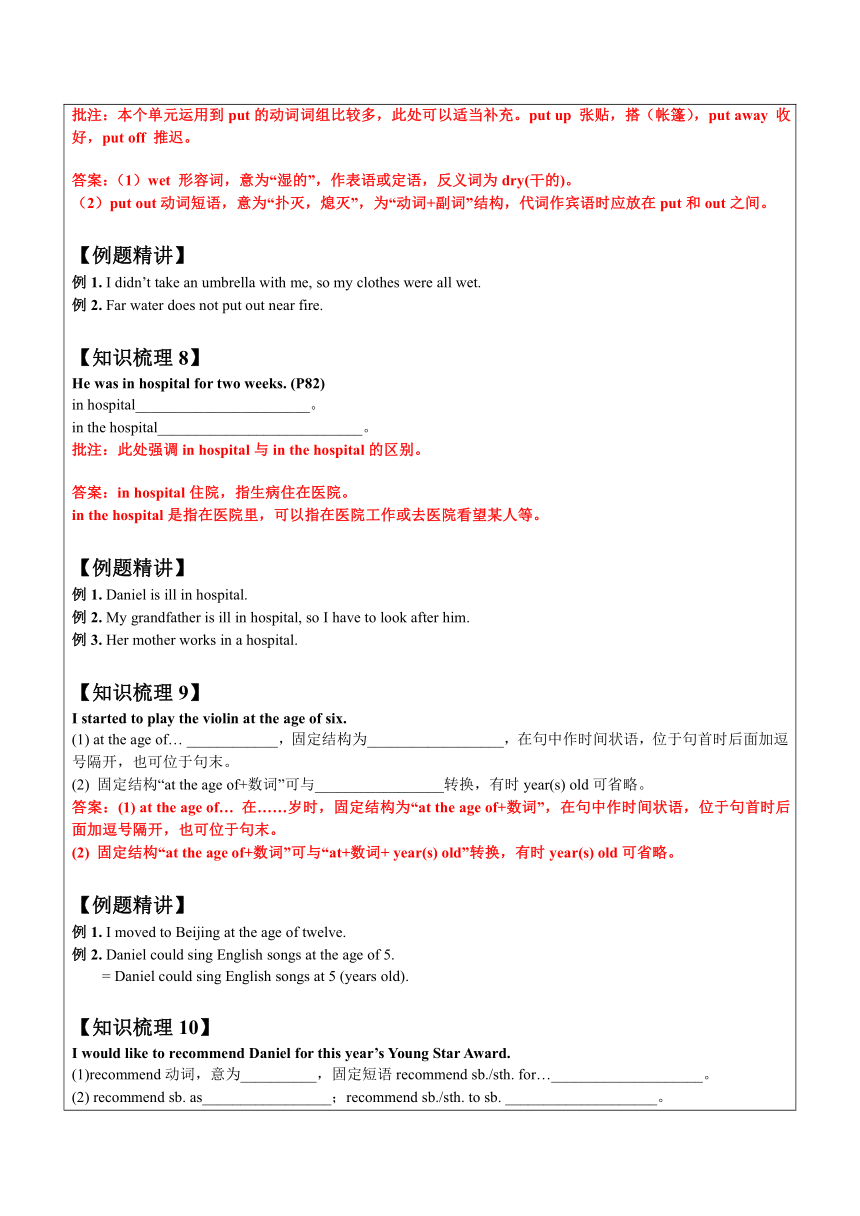
文档简介
课程主题: 7BU7-8 2023年安徽中考高频考点及易错点
学习目标 1.掌握7B Unit 7-8重要的短语搭配与重点词汇的意思与运用;2.重难点词汇在句型以及不同题型中的灵活应用。
教学内容
【进门测试】1. ---Jane, your bedroom is so dirty. ---Sorry, I’ll _____________.A. clean up it B. clean it up C. clean them up D. clean up them答案:B批注:根据句中“your bedroom”为单数可知,代词要用it且应放在clean与up的中间,所以答案选B。2. Amy hurt her leg last Wednesday, so he _________ walk to school.A. can’t B. couldn’t C. was not able to D. B&C答案:D批注:埃米上周三伤了腿,所以她不能步行去上学了。表示“不能”用情态动词can’t或not be able to, 由句中“last Wednesday”可知该句为过去时。3. ---This desk is too heavy. I ___________ move it. Could you help me ---No problem.A. can B. can’t C. should D. may答案:B批注:根据句意可知,表示现在的能力要用情态动词can,否定式为can’t。4. ---What a beautiful sweater! How much did you ________ it ---200 yuan.A. cost B. take C. spend D. pay for答案:D批注:根据句意及主语“you”为人可知,要用固定句型sb. pay(s) some money for sth. 表示“某人为某物付钱”。5. The ___________ boy is able to count from 1 to 1,000.A. three-year-old B. three-years-old C. three years old D. three year old答案:A批注:根据句意及选项可知,要用复合形容词“数词+名词+形容词”构成的结构作前置定语,名词用单数形式。6. The fire was completely(彻底地) _________ shortly afterwards with the help of the firemen.A. cut down B. put out C. cut down D. put on答案:B批注:根据句意可知,表示火被“扑灭”用动词短语put out.7. ---Where is the sick boy now ---He is ________________.A. on the hospital B. in hospital C. at the hospital D. living hospital答案:B批注:根据题意,那个生病的男孩正在住院,住院用词组in hospital, in the hospital意思是在医院里,所以选B。8. Fire may be very dangerous if we are not ___________.A. enough carefully B. carefully enough C. careful enough D. enough careful答案:C批注:本题考查的是careful的词性判断和enough的用法。are是系动词,后面跟形容词,所以首先判断用careful; enough与形容词连用时放后面,所以应该是careful enough, 本题答案选C。【多元导学】Let’s review something about U7-8, please fill the form on your own without referring to your textbook.UnitReadingGrammarKey wordse.g. Dream homesHomes around the worldCardinal numbersOrdinal numberslook out of/look out atThe capital of ...be different from/inof one’s owninvite sb. to do sth.答案:UnitReadingGrammarKey wordse.g. Dream homesHomes around the worldCardinal numbersOrdinal numberslook out of/look out atThe capital of ...be different from/inof one’s owninvite sb. to do sth.ShoppingGoing shoppingA Using some/anyB Using there besend sth to sbsend sb sthpay forFashionThe fashion showPresent continuous tensefeed onlook aftertake care ofgrow up【互动精讲】知识点一(Unit 7)【知识梳理1】giving a seat to someone on the bus(P81) seat名词,意为 __________,give a seat to sb. __________________,也可表达为________________。seat的动词为____________,固定短语sit down_____________,相当于___________________。答案:seat名词,意为“座位”,give a seat to sb. 给某人让座,也可表达为give seats to sb.seat的动词为sit(坐),固定短语sit down坐,坐下,相当于take/have a seat.【例题精讲】例1. There is no seat on the bus. 例2. It’s polite to give a seat to the old. 【知识梳理2】We can send some to them. (P81) send动词,意为__________,固定短语send sb. sth. =______________,表示________________,to为介词。send作动词,还可表示_____________,固定短语send for________________。答案:send动词,意为“送,邮寄”,固定短语send sb. sth. =send sth. to sb. 表示“把某物发送给某人”,to为介词。send作动词,还可表示“派送”,固定短语send for 派人去请【例题精讲】例1. Don’t forget to send me an e-mail. =Don’t forget to send an e-mail to me. 【知识梳理3】Some families are not even able to pay for pens and notebooks. (P81) (1) even 副词,意为__________,放在表示意外的词语前加强语气,可用来修饰_____________。(2) pay for________________,固定短语pay for sth.________________。“pay+金钱+for sth. ” 意为__________________。pay动词,意为__________________。批注:注意pay for……, spend, take, cost这几个单词词组的用法辨析。 答案:(1) even 副词,意为“甚至”,放在表示意外的词语前加强语气,可用来修饰动词或名词。(2) pay for 为…付款,固定短语pay for sth. 为某物付钱;“pay+金钱+for sth.” 意为“付……钱买某物”。pay动词,意为“付钱;给……报酬”。【例题精讲】例1. He is even rude to the police. 例2. Who will pay for the lunch 【知识梳理4】He was brave enough to save his neighbor from a fire. (P82) (1) enough在句子中做副词。常用_______________________________句式表示“足够的……做某事”。enough 用作形容词,通常修饰________________,可放在被修饰名词________或__________。(2) save 动词,意为_____________,固定短语为:save sb. ________________; save sb. from… _________________;save one’s life____________________。批注:save还可以作为动词,“储蓄;存钱;保存”;“节省,节约”。例: I plan to save money every month. We should save water. 答案:(1) enough在句子中做副词。常用adj/adv+ enough to do sth. 句式表示“足够的……做某事”。enough 用作形容词,通常修饰复数名词或不可数名词,可放在被修饰名词之前或之后。(2) save 动词,意为“救,救助”,固定短语为:save sb. 救某人;save sb. from… 从……中救出某人;save one’s life救某人的命。【例题精讲】例1. Li Ming is seven. She is old enough to go to school. 例2. He has enough money to buy a car. 【知识梳理5】Suddenly, he heard someone shouting “Fire! Fire! Help!” (P82) hear sb doing sth.句型结构的意思是_____________________________。 hear sb do sth. 句型结构的意思是____________________,该句型结构强调经常或所做的某事已经过去,主语听到的是动作发生的全过程。【例题精讲】例1. I heard the girl singing in her room. 例2. I heard you play the piano last night. 批注:此类用法还有:感(feel)听(hear)看(see)答案:hear sb doing sth.句型结构的意思是“听见某人正在做某事”。 hear sb do sth句型结构的意思是 “听见某人做了某事”,该句型结构强调经常或所做的某事已经过去,主语听到的是动作发生的全过程。【知识梳理6】Her left leg was badly hurt and she could not get out. (P82) hurt形容词,意为 ______________,作______________。hurt及物动词,意为________________,宾语通常是___________________________。 hurt不及物动词,意为________________。答案:hurt形容词,意为“受伤的”,作定语或表语。 hurt及物动词,意为“使受伤,伤害”,宾语通常是某人、人身体部位的名词或人的感情。 hurt不及物动词,意为“疼”。【例题精讲】例1. His left knee was hurt in a traffic accident. 例2. Be careful not to hurt yourself. 例3. Her head often hurts. 【知识梳理7】He put a wet blanket over Mrs Sun and helped her out. Later some firemen came and put out the fire. (P82) wet 形容词,意为_______________,作表语或定语,反义词为_______________。put out动词短语,意为_________________,为_________________结构,代词作宾语时应放在_________________。批注:本个单元运用到put的动词词组比较多,此处可以适当补充。put up 张贴,搭(帐篷),put away 收好,put off 推迟。答案:(1)wet 形容词,意为“湿的”,作表语或定语,反义词为dry(干的)。(2)put out动词短语,意为“扑灭,熄灭”,为“动词+副词”结构,代词作宾语时应放在put和out之间。【例题精讲】例1. I didn’t take an umbrella with me, so my clothes were all wet. 例2. Far water does not put out near fire. 【知识梳理8】He was in hospital for two weeks. (P82) in hospital_______________________。in the hospital___________________________。批注:此处强调in hospital与in the hospital的区别。答案:in hospital住院,指生病住在医院。 in the hospital是指在医院里,可以指在医院工作或去医院看望某人等。【例题精讲】例1. Daniel is ill in hospital. 例2. My grandfather is ill in hospital, so I have to look after him. 例3. Her mother works in a hospital. 【知识梳理9】I started to play the violin at the age of six. (1) at the age of… ____________,固定结构为__________________,在句中作时间状语,位于句首时后面加逗号隔开,也可位于句末。(2) 固定结构“at the age of+数词”可与_________________转换,有时year(s) old可省略。答案:(1) at the age of… 在……岁时,固定结构为“at the age of+数词”,在句中作时间状语,位于句首时后面加逗号隔开,也可位于句末。(2) 固定结构“at the age of+数词”可与“at+数词+ year(s) old”转换,有时year(s) old可省略。【例题精讲】例1. I moved to Beijing at the age of twelve. 例2. Daniel could sing English songs at the age of 5. = Daniel could sing English songs at 5 (years old).【知识梳理10】I would like to recommend Daniel for this year’s Young Star Award.(1)recommend动词,意为__________,固定短语recommend sb./sth. for…____________________。(2) recommend sb. as_________________;recommend sb./sth. to sb. ____________________。批注:recommend常考的是它的短语搭配,注意后面跟介词for, as, to时的不同用法。 答案:(1)recommend动词,意为“推荐”,固定短语recommend sb./sth. for…推荐某人/某物(获……奖)。 (2) recommend sb. as推荐某人担任(某职务);recommend sb./sth. to sb. 把某人/某物推荐给某人。【例题精讲】例1. We recommend her for Youth Award. 例2. Can you recommend a good place for dinner 例3. Before class, he recommended a book by Lao She to us. 例4. I’d like to recommend Daniel as/to be our monitor. 【知识梳理11】We look forward to hearing from you soon. hear from 动词短语,意为________________,相当于___________________,后面只能接表示人的词。 hear of/about__________________答案:hear from 动词短语,意为“收到……的来信”,相当于get a letter from,后面只能接表示人的词。hear of/about 听说【例题精讲】例1. I hear from my uncle twice a week. 例2. I heard of his death last week. 知识点二(Unit 8)【知识梳理1】Hobo, bring me something to eat.(P92)(1)bring 是一个动词,意思是___________________,常用_____________________。 (2)bring ,take ,get, carry 和hold的区别bring: ________________________take : ________________________get: ________________________carry: ________________________hold: ________________________批注:bring 和take的用法是初一考试中的重点,老师在讲解的时候要重点强调这两个词“方向性”不同的问题。答案:(1)bring 是一个动词,意思是“把(某物从别处)……拿来”。常用bring sb sth / bring sth to sb (2)bring, take, get, carry 和hold的区别。bring 是指从另一处把某物“拿到”说话人处,译为:带来take 是从说话处“拿到”别的地方去,译为:带走get 指去另一处“把……拿回说话人处”。carry 指“把……从一处拿、带、运到另一处”,无方向性限制。hold 意思是“握住,拿在手上、抱、抓住”。等【例题精讲】例1. He always brings a bottle of juice to me when he comes back. 【知识梳理2】I like goldfish because I like watching them swim around .(P93)(1)watch them swim around 意思是__________________,所用的句子结构是___________________________,表示____________________。(2)watch ,see ,hear 后接宾语+宾语补足语的时候一样,后加动词原形作宾语补足语表示动作的过程,后加动词+ing形式作宾语补足语表示动作“正在进行”。批注:老师要重点给学生强调watch sb. do sth. 看见某人做某事(指看见全过程) watch sb. doing sth. 看见某人正在做某事(强调看到某人正在做某事)答案:(1)watch them swim around 意思是“观看他们游来游去”,所用的句子结构是“watch +宾语(名词或代词)+宾语补足语”,表示“观看某人做某事”。【例题精讲】例1. I often watch them play football in the football field.例2. We sat on the beach and watched the sun rise. 【知识梳理3】 I like my mouse best because it’s very small and soft and I can hold it in my hand.(P93)hold sth in one’s hand 意为________________________。答案:hold sth in one’s hand 意为“把某物抓在手心里”。【例题精讲】例1. The policeman held a torch in his hand. 【知识梳理4】I can feed her carrots and I like her long ears. (P93)feed sth. to sb. 意思是____________________,= ___________________。(2)feed on... 意思是_____________________。答案:(1)feed sth. to sb. 意思是“喂……给……”,= feed sb. (on / with) sth.(2)feed on... 以……为食【例题精讲】例1. You can feed the sheep with some grass = You can feed the sheep to some grass. 例2. These little bears feed on the leaves. 【知识梳理5】With eyes open wide.(P94)(1)with 引导的短语在这里指_________________。 (2)with 可以表示________________。(3)with 还可以表示_________________。(4)wide 用作形容词,意为________________,可以用作定语、表语等句子成分。wide 还可用作副词,意为_____________________。答案:(1)with 引导的短语在这里指伴随状态。 (2)with 可以表示“用”的意思。(3)with 还可以表示“有,带有”的意思。(4)wide 用作形容词,意为“宽广的,宽阔的”,可以用作定语、表语等句子成分。 wide 还可用作副词,意为“充分地”。【例题精讲】例1. The singer is singing with some flowers in his hand. 例2. Can I write with a red pen 例3. I want a house with a big garden. 例4. The wide street is to the People’s Park. 例5. English is widely used in the world. 【知识梳理6】She doesn’t need a gentle touch.(P94) (1) touch动词,意为___________,常用touch sb on the head ___________________。 (2) touch还有___________的意思,与move “感动”,是同义词。答案:(1) touch动词,意为“触摸”,常用touch sb on the head “摸某人的头”。(2) touch还有“感动”的意思,与move “感动”,是同义词。【例题精讲】例1. Don’t touch the place on the table . 例2. Her words touched us . 【知识梳理7】He hunts when I hide.(P95)(1)hunt 用作不及物动词,表示____________________之意,常用短语:hunt for / after_________________go hunting _____________________(2)hunt 也可用作名词,意思是“打猎”,其复数名词是_____________. 答案:(1)hunt 用作不及物动词,表示“寻找、打猎”之意,常用短语: hunt for / after “追猎……;搜寻……”;go hunting “去打猎”.hunt 也可用作名词,其复数名词是hunts. 【例题精讲】例1. The dog is hunting after a fox . 例2. We will go out for a hunt this weekend . 【知识梳理8】She sleeps anywhere.(P97)anywhere副词,意思是______________。这个词是由_______________构成的副词。与该词同属一组的还有:some + where = somewhere____________________no + where = nowhere_______________________every + where = everywhere_____________________用法:somewhere,everywhere用在__________中,anywhere用在__________中(偶尔也可用在陈述句中);anywhere,nowhere用在______________中(和some,any,no,every的用法相近)。答案:anywhere用作副词,意思是“任何地方”。这个词是由any +where构成的副词。与该词同属一组的还有:some +where=somewhere “在某处,到某处”no +where=nowhere“无处”every +where=everywhere“处处,到处”用法:somewhere,everywhere用在肯定句中,anywhere用在疑问句中(偶尔也可用在陈述句中);anywhere,nowhere用在否定句中(和some,any,no,every的用法相近)。【例题精讲】例1. We went to look for him, but we couldn’t find him anywhere. 例2. When you go anywhere, you can find pet dogs. 【知识梳理9】Goldfish are easy to look after.(P98)sb. /sth. is easy to do句型,表示___________________。其中动词不定式to do和主语之间有谓宾关系,因此,动词不定式必须是及物动词或者相当于及物动词的动词短语;而且这个动词或动词短语不能再加上宾语(句子的主语和其有谓宾关系)。答案:sb. /sth. is easy to do…句型,表示: 某人或某物容易……。其中动词不定式to do和主语之间有谓宾关系,因此,动词不定式必须是及物动词或者相当于及物动词的动词短语;而且这个动词或动词短语不能再加上宾语(句子的主语和其有谓宾关系)【例题精讲】例1. This question is easy to answer. 例2. Cats and dogs are easy to take care of. 【知识梳理10】They can grow up to be …centimeters long and weigh up to ……grams. (P100)grow up__________________grow into ________________up to…_________________weigh vt./vi._______________作动词表示重量时,所用句型是______________________. 名词形式是________,虽然也表示重量,但是用法不同。对重量部分提问时,用____________。答案:(1)grow up:成长,长大成人。grow into 长大成为……(2)up to…达到;多达。(3)weigh vt./vi. 重, 称……重作动词表示重量时,所用句型是sth / sb weighs…(kilo)grams/tons. 名词形式是weight,虽然也表示重量,但是用法不同。对重量部分提问时,用how much。【例题精讲】例1. The child will grow up in a few years. 例2. I want to be a policeman when I grow up. 例3. Three years later, she grew into a beautiful woman. 例4. The dining hall can hold up to 500 people at the same time. 例5. He kept me waiting for up to 3 hours. 例6. The little dog only weighs two kilograms. 例7. The machine weighs one ton. 例8. They say the weight of the largest dinosaur is over 100,000 kilograms. 例9. --How much does the elephant weigh --It weighs over 2000kilograms. 【知识梳理11】Do they make any noise (P100)noise用作名词,表示________________,是不可数名词。常用短语:make noise _______________noisy是由名词加上词尾-y转换而来的形容词,意为______________;反义词是____________。答案:noise用作名词,表示“声音,噪音”之意时,是不可数名词。常用短语:make noise 制造噪音。 noisy是由名词加上词尾-y转换而来的形容词,意为“吵闹的,嘈杂的”;反义词是quiet。【例题精讲】例1. I heard a noise in the next room. 例2. We don’t know what these strange noises are from. 例3. The classroom is too noisy. 【知识梳理12】Do you walk your cat, Amy (P100)(1) walk作及物动词,表示________________之意,常用walk the dog____________,walk the bird___________。(2) walk也可作名词,表示___________。常用短语:take a walk___________ take the dog for a walk = walk his dog_____________【例题精讲】例1. I seldom walk my pet dog. 例2. He always walks his dog every afternoon. 例3. He often takes a walk with his parents. 批注:老师要重点给学生强调walk的两种词性。答案:(1) walk作及物动词,可以表示“带……散步,带……遛弯”之意,常用walk the dog,遛狗;walk the bird,遛鸟。 (2) walk也可作名词,表示散步。常用短语:take a walk 散步 take the dog for a walk=walk his dog 遛狗 【课堂检测】一、单项选择( ) 1. You should keep the small cat ____________ in such hot weather. A. clearly B. clean C. health D. warmly( ) 2. They all know that it isn't difficult__________ cats. A. take care B. take care of C. to look after D. look after( ) 3. Can you tell me________________ make nice coffee A. to how B. how C. to D. how to( )4. ______ is important ______ fish fresh water. A. That; to give B. It; to give C. That; giving D. It; to giving( )5. Peter likes watching his goldfish ______ around every day. A. to swim B. swim C. swimming D. swims( )6. My dog likes to ______, but it never ________ me. A. bark; bark at B. barking; bark C. bark; barks at D. bark at; barks( )7. Who taught you ______ a rabbit A. feed B. feeding C. to feed D. fed( )8. We are not in _______ . We are in_____________. A. same class; different class B. same classes; different classes C. the same class; the different class D. the same class; different classes( ) 9. Feeding the fish _______ is bad for them. A. much too food B. too much food C. much too foods D. too much foods( ) 10. Don’t read ______ the sun and it’s bad ______ your eyes. A. under; for B. in; for C. with; for D. in; to答案:1-5 BCDBB 6-10 CCDBB二、阅读From Asia to America and everywhere in between, Swing-an energetic form of dance that includes six-step and eight-step rhythms(节奏) - has taken the world by storm. Making a recent comeback, swing dance floors have popped up all over the world. Many clubs make fans of Swing happy by holding nights when swing music is played, and sometimes even offering classes to attract customers.Though Swing is now popular worldwide, it first appeared alongside the jazz movements of the 1920s and 1930s in New York City. While listening to jazz, the young black people of that time developed the movements of the Lindy Hop - a style of dance that is best known for a break away or ‘swing out’ move and sudden improvisation(即兴表演).It was reportedly given this name when a reporter was interviewing a person at the dance hall who was watching other couples dance. When asked what that dance was called, the watcher looked at a newspaper next to him that had an article about Lindbergh- the first person to fly alone across the Atlantic(大西洋)-which was titled, ‘Lindy Hops the Atlantic’. Then the watcher announced that the ‘Lindy Hop’ was the name of the dance, and it has stuck since then.In 1926, the Savoy Ballroom was the first large business to offer a place for people to listen to swing music and dance. With its huge dance floor, the Savoy became a big success overnight, attracting some of the best dancers and musicians in the New York area.Within ten years, the Lindy Hops was sweeping through the United States and became a symbol of unity, as young people of all racial(种族的)backgrounds crowded into dance halls to swing the night away. Traditional dance teachers did not welcome it because they thought it was not even a real dance and were quite sure about its demise but Swing has proved them wrong; it continues to be one of the world’s most fun dances.1. The writing purpose of this passage is __________.A. to introduce a popular form of danceB. to discover the fun secrets of a danceC. to tell stories about an energetic danceD. to describe the special moves of a dance2. Which of the following words has the closest meaning to ‘demise’ A. Challenge. B. Change. C. Development. D. Death.3. What can we learn about Swing A. It’s a lively dance with strict rules. B. It has a close connection to a pilot.C. It has a history of around 90 years. D. It attracts mostly young black people.4. What can we infer(推断)from the passage
A. The dance style will soon be accepted by traditional dance teachers.B. The name was changed from ‘Lindy Hop’ to ‘Swing’ in the 1940s.C. The movements of different Swing dancers always look the same.D. The dance might have become unpopular sometime in its history.答案: ADCA【要点回顾】【温故知新】课后巩固单选( ) 1. I’m hungry. I want ______ to eat. A. anything B. something C. everything D. nothing( ) 2. —Do you have ______ to say for yourself —No, I have ______ to say. A. something; everything B. nothing; something C. everything; anything D. anything; nothing( ) 3. Why not ask ______ to help you A. everyone B. Someone C. anyone D. none( ) 4. Everything ______ ready. We can start now. A. are B. is C. be D. were( ) 5. There’s ______ with his eyes. He’s OK. A. anything wrong B. wrong something C. nothing wrong D. wrong nothing( )6. She listened carefully, but heard ______. A. anything B. something C. everything D. nothing( )7. I agree with most of what you said, but I don’t agree with ______. A. everything B. Anything C. something D. nothing( )8. Everything goes well, ______ A. is it B. isn’t it C. do they D. doesn’t it( )9. ________ of us is active in English class. A. Every B. Every one C. Everyone D. Anybody( )10. — The exam was difficult, wasn't it — No, but I don't think______ could pass it. A. somebody B. anybody C. nobody D. everybody答案:1-5 BDBBC 6-10 DADBD预习思考Let’s review something about U1-8, please fill the form on your own without referring to your textbook.UnitReadingGrammarKey wordse.g. Amazing thingsThe ghost in the parkSimple past tense......
学习目标 1.掌握7B Unit 7-8重要的短语搭配与重点词汇的意思与运用;2.重难点词汇在句型以及不同题型中的灵活应用。
教学内容
【进门测试】1. ---Jane, your bedroom is so dirty. ---Sorry, I’ll _____________.A. clean up it B. clean it up C. clean them up D. clean up them答案:B批注:根据句中“your bedroom”为单数可知,代词要用it且应放在clean与up的中间,所以答案选B。2. Amy hurt her leg last Wednesday, so he _________ walk to school.A. can’t B. couldn’t C. was not able to D. B&C答案:D批注:埃米上周三伤了腿,所以她不能步行去上学了。表示“不能”用情态动词can’t或not be able to, 由句中“last Wednesday”可知该句为过去时。3. ---This desk is too heavy. I ___________ move it. Could you help me ---No problem.A. can B. can’t C. should D. may答案:B批注:根据句意可知,表示现在的能力要用情态动词can,否定式为can’t。4. ---What a beautiful sweater! How much did you ________ it ---200 yuan.A. cost B. take C. spend D. pay for答案:D批注:根据句意及主语“you”为人可知,要用固定句型sb. pay(s) some money for sth. 表示“某人为某物付钱”。5. The ___________ boy is able to count from 1 to 1,000.A. three-year-old B. three-years-old C. three years old D. three year old答案:A批注:根据句意及选项可知,要用复合形容词“数词+名词+形容词”构成的结构作前置定语,名词用单数形式。6. The fire was completely(彻底地) _________ shortly afterwards with the help of the firemen.A. cut down B. put out C. cut down D. put on答案:B批注:根据句意可知,表示火被“扑灭”用动词短语put out.7. ---Where is the sick boy now ---He is ________________.A. on the hospital B. in hospital C. at the hospital D. living hospital答案:B批注:根据题意,那个生病的男孩正在住院,住院用词组in hospital, in the hospital意思是在医院里,所以选B。8. Fire may be very dangerous if we are not ___________.A. enough carefully B. carefully enough C. careful enough D. enough careful答案:C批注:本题考查的是careful的词性判断和enough的用法。are是系动词,后面跟形容词,所以首先判断用careful; enough与形容词连用时放后面,所以应该是careful enough, 本题答案选C。【多元导学】Let’s review something about U7-8, please fill the form on your own without referring to your textbook.UnitReadingGrammarKey wordse.g. Dream homesHomes around the worldCardinal numbersOrdinal numberslook out of/look out atThe capital of ...be different from/inof one’s owninvite sb. to do sth.答案:UnitReadingGrammarKey wordse.g. Dream homesHomes around the worldCardinal numbersOrdinal numberslook out of/look out atThe capital of ...be different from/inof one’s owninvite sb. to do sth.ShoppingGoing shoppingA Using some/anyB Using there besend sth to sbsend sb sthpay forFashionThe fashion showPresent continuous tensefeed onlook aftertake care ofgrow up【互动精讲】知识点一(Unit 7)【知识梳理1】giving a seat to someone on the bus(P81) seat名词,意为 __________,give a seat to sb. __________________,也可表达为________________。seat的动词为____________,固定短语sit down_____________,相当于___________________。答案:seat名词,意为“座位”,give a seat to sb. 给某人让座,也可表达为give seats to sb.seat的动词为sit(坐),固定短语sit down坐,坐下,相当于take/have a seat.【例题精讲】例1. There is no seat on the bus. 例2. It’s polite to give a seat to the old. 【知识梳理2】We can send some to them. (P81) send动词,意为__________,固定短语send sb. sth. =______________,表示________________,to为介词。send作动词,还可表示_____________,固定短语send for________________。答案:send动词,意为“送,邮寄”,固定短语send sb. sth. =send sth. to sb. 表示“把某物发送给某人”,to为介词。send作动词,还可表示“派送”,固定短语send for 派人去请【例题精讲】例1. Don’t forget to send me an e-mail. =Don’t forget to send an e-mail to me. 【知识梳理3】Some families are not even able to pay for pens and notebooks. (P81) (1) even 副词,意为__________,放在表示意外的词语前加强语气,可用来修饰_____________。(2) pay for________________,固定短语pay for sth.________________。“pay+金钱+for sth. ” 意为__________________。pay动词,意为__________________。批注:注意pay for……, spend, take, cost这几个单词词组的用法辨析。 答案:(1) even 副词,意为“甚至”,放在表示意外的词语前加强语气,可用来修饰动词或名词。(2) pay for 为…付款,固定短语pay for sth. 为某物付钱;“pay+金钱+for sth.” 意为“付……钱买某物”。pay动词,意为“付钱;给……报酬”。【例题精讲】例1. He is even rude to the police. 例2. Who will pay for the lunch 【知识梳理4】He was brave enough to save his neighbor from a fire. (P82) (1) enough在句子中做副词。常用_______________________________句式表示“足够的……做某事”。enough 用作形容词,通常修饰________________,可放在被修饰名词________或__________。(2) save 动词,意为_____________,固定短语为:save sb. ________________; save sb. from… _________________;save one’s life____________________。批注:save还可以作为动词,“储蓄;存钱;保存”;“节省,节约”。例: I plan to save money every month. We should save water. 答案:(1) enough在句子中做副词。常用adj/adv+ enough to do sth. 句式表示“足够的……做某事”。enough 用作形容词,通常修饰复数名词或不可数名词,可放在被修饰名词之前或之后。(2) save 动词,意为“救,救助”,固定短语为:save sb. 救某人;save sb. from… 从……中救出某人;save one’s life救某人的命。【例题精讲】例1. Li Ming is seven. She is old enough to go to school. 例2. He has enough money to buy a car. 【知识梳理5】Suddenly, he heard someone shouting “Fire! Fire! Help!” (P82) hear sb doing sth.句型结构的意思是_____________________________。 hear sb do sth. 句型结构的意思是____________________,该句型结构强调经常或所做的某事已经过去,主语听到的是动作发生的全过程。【例题精讲】例1. I heard the girl singing in her room. 例2. I heard you play the piano last night. 批注:此类用法还有:感(feel)听(hear)看(see)答案:hear sb doing sth.句型结构的意思是“听见某人正在做某事”。 hear sb do sth句型结构的意思是 “听见某人做了某事”,该句型结构强调经常或所做的某事已经过去,主语听到的是动作发生的全过程。【知识梳理6】Her left leg was badly hurt and she could not get out. (P82) hurt形容词,意为 ______________,作______________。hurt及物动词,意为________________,宾语通常是___________________________。 hurt不及物动词,意为________________。答案:hurt形容词,意为“受伤的”,作定语或表语。 hurt及物动词,意为“使受伤,伤害”,宾语通常是某人、人身体部位的名词或人的感情。 hurt不及物动词,意为“疼”。【例题精讲】例1. His left knee was hurt in a traffic accident. 例2. Be careful not to hurt yourself. 例3. Her head often hurts. 【知识梳理7】He put a wet blanket over Mrs Sun and helped her out. Later some firemen came and put out the fire. (P82) wet 形容词,意为_______________,作表语或定语,反义词为_______________。put out动词短语,意为_________________,为_________________结构,代词作宾语时应放在_________________。批注:本个单元运用到put的动词词组比较多,此处可以适当补充。put up 张贴,搭(帐篷),put away 收好,put off 推迟。答案:(1)wet 形容词,意为“湿的”,作表语或定语,反义词为dry(干的)。(2)put out动词短语,意为“扑灭,熄灭”,为“动词+副词”结构,代词作宾语时应放在put和out之间。【例题精讲】例1. I didn’t take an umbrella with me, so my clothes were all wet. 例2. Far water does not put out near fire. 【知识梳理8】He was in hospital for two weeks. (P82) in hospital_______________________。in the hospital___________________________。批注:此处强调in hospital与in the hospital的区别。答案:in hospital住院,指生病住在医院。 in the hospital是指在医院里,可以指在医院工作或去医院看望某人等。【例题精讲】例1. Daniel is ill in hospital. 例2. My grandfather is ill in hospital, so I have to look after him. 例3. Her mother works in a hospital. 【知识梳理9】I started to play the violin at the age of six. (1) at the age of… ____________,固定结构为__________________,在句中作时间状语,位于句首时后面加逗号隔开,也可位于句末。(2) 固定结构“at the age of+数词”可与_________________转换,有时year(s) old可省略。答案:(1) at the age of… 在……岁时,固定结构为“at the age of+数词”,在句中作时间状语,位于句首时后面加逗号隔开,也可位于句末。(2) 固定结构“at the age of+数词”可与“at+数词+ year(s) old”转换,有时year(s) old可省略。【例题精讲】例1. I moved to Beijing at the age of twelve. 例2. Daniel could sing English songs at the age of 5. = Daniel could sing English songs at 5 (years old).【知识梳理10】I would like to recommend Daniel for this year’s Young Star Award.(1)recommend动词,意为__________,固定短语recommend sb./sth. for…____________________。(2) recommend sb. as_________________;recommend sb./sth. to sb. ____________________。批注:recommend常考的是它的短语搭配,注意后面跟介词for, as, to时的不同用法。 答案:(1)recommend动词,意为“推荐”,固定短语recommend sb./sth. for…推荐某人/某物(获……奖)。 (2) recommend sb. as推荐某人担任(某职务);recommend sb./sth. to sb. 把某人/某物推荐给某人。【例题精讲】例1. We recommend her for Youth Award. 例2. Can you recommend a good place for dinner 例3. Before class, he recommended a book by Lao She to us. 例4. I’d like to recommend Daniel as/to be our monitor. 【知识梳理11】We look forward to hearing from you soon. hear from 动词短语,意为________________,相当于___________________,后面只能接表示人的词。 hear of/about__________________答案:hear from 动词短语,意为“收到……的来信”,相当于get a letter from,后面只能接表示人的词。hear of/about 听说【例题精讲】例1. I hear from my uncle twice a week. 例2. I heard of his death last week. 知识点二(Unit 8)【知识梳理1】Hobo, bring me something to eat.(P92)(1)bring 是一个动词,意思是___________________,常用_____________________。 (2)bring ,take ,get, carry 和hold的区别bring: ________________________take : ________________________get: ________________________carry: ________________________hold: ________________________批注:bring 和take的用法是初一考试中的重点,老师在讲解的时候要重点强调这两个词“方向性”不同的问题。答案:(1)bring 是一个动词,意思是“把(某物从别处)……拿来”。常用bring sb sth / bring sth to sb (2)bring, take, get, carry 和hold的区别。bring 是指从另一处把某物“拿到”说话人处,译为:带来take 是从说话处“拿到”别的地方去,译为:带走get 指去另一处“把……拿回说话人处”。carry 指“把……从一处拿、带、运到另一处”,无方向性限制。hold 意思是“握住,拿在手上、抱、抓住”。等【例题精讲】例1. He always brings a bottle of juice to me when he comes back. 【知识梳理2】I like goldfish because I like watching them swim around .(P93)(1)watch them swim around 意思是__________________,所用的句子结构是___________________________,表示____________________。(2)watch ,see ,hear 后接宾语+宾语补足语的时候一样,后加动词原形作宾语补足语表示动作的过程,后加动词+ing形式作宾语补足语表示动作“正在进行”。批注:老师要重点给学生强调watch sb. do sth. 看见某人做某事(指看见全过程) watch sb. doing sth. 看见某人正在做某事(强调看到某人正在做某事)答案:(1)watch them swim around 意思是“观看他们游来游去”,所用的句子结构是“watch +宾语(名词或代词)+宾语补足语”,表示“观看某人做某事”。【例题精讲】例1. I often watch them play football in the football field.例2. We sat on the beach and watched the sun rise. 【知识梳理3】 I like my mouse best because it’s very small and soft and I can hold it in my hand.(P93)hold sth in one’s hand 意为________________________。答案:hold sth in one’s hand 意为“把某物抓在手心里”。【例题精讲】例1. The policeman held a torch in his hand. 【知识梳理4】I can feed her carrots and I like her long ears. (P93)feed sth. to sb. 意思是____________________,= ___________________。(2)feed on... 意思是_____________________。答案:(1)feed sth. to sb. 意思是“喂……给……”,= feed sb. (on / with) sth.(2)feed on... 以……为食【例题精讲】例1. You can feed the sheep with some grass = You can feed the sheep to some grass. 例2. These little bears feed on the leaves. 【知识梳理5】With eyes open wide.(P94)(1)with 引导的短语在这里指_________________。 (2)with 可以表示________________。(3)with 还可以表示_________________。(4)wide 用作形容词,意为________________,可以用作定语、表语等句子成分。wide 还可用作副词,意为_____________________。答案:(1)with 引导的短语在这里指伴随状态。 (2)with 可以表示“用”的意思。(3)with 还可以表示“有,带有”的意思。(4)wide 用作形容词,意为“宽广的,宽阔的”,可以用作定语、表语等句子成分。 wide 还可用作副词,意为“充分地”。【例题精讲】例1. The singer is singing with some flowers in his hand. 例2. Can I write with a red pen 例3. I want a house with a big garden. 例4. The wide street is to the People’s Park. 例5. English is widely used in the world. 【知识梳理6】She doesn’t need a gentle touch.(P94) (1) touch动词,意为___________,常用touch sb on the head ___________________。 (2) touch还有___________的意思,与move “感动”,是同义词。答案:(1) touch动词,意为“触摸”,常用touch sb on the head “摸某人的头”。(2) touch还有“感动”的意思,与move “感动”,是同义词。【例题精讲】例1. Don’t touch the place on the table . 例2. Her words touched us . 【知识梳理7】He hunts when I hide.(P95)(1)hunt 用作不及物动词,表示____________________之意,常用短语:hunt for / after_________________go hunting _____________________(2)hunt 也可用作名词,意思是“打猎”,其复数名词是_____________. 答案:(1)hunt 用作不及物动词,表示“寻找、打猎”之意,常用短语: hunt for / after “追猎……;搜寻……”;go hunting “去打猎”.hunt 也可用作名词,其复数名词是hunts. 【例题精讲】例1. The dog is hunting after a fox . 例2. We will go out for a hunt this weekend . 【知识梳理8】She sleeps anywhere.(P97)anywhere副词,意思是______________。这个词是由_______________构成的副词。与该词同属一组的还有:some + where = somewhere____________________no + where = nowhere_______________________every + where = everywhere_____________________用法:somewhere,everywhere用在__________中,anywhere用在__________中(偶尔也可用在陈述句中);anywhere,nowhere用在______________中(和some,any,no,every的用法相近)。答案:anywhere用作副词,意思是“任何地方”。这个词是由any +where构成的副词。与该词同属一组的还有:some +where=somewhere “在某处,到某处”no +where=nowhere“无处”every +where=everywhere“处处,到处”用法:somewhere,everywhere用在肯定句中,anywhere用在疑问句中(偶尔也可用在陈述句中);anywhere,nowhere用在否定句中(和some,any,no,every的用法相近)。【例题精讲】例1. We went to look for him, but we couldn’t find him anywhere. 例2. When you go anywhere, you can find pet dogs. 【知识梳理9】Goldfish are easy to look after.(P98)sb. /sth. is easy to do句型,表示___________________。其中动词不定式to do和主语之间有谓宾关系,因此,动词不定式必须是及物动词或者相当于及物动词的动词短语;而且这个动词或动词短语不能再加上宾语(句子的主语和其有谓宾关系)。答案:sb. /sth. is easy to do…句型,表示: 某人或某物容易……。其中动词不定式to do和主语之间有谓宾关系,因此,动词不定式必须是及物动词或者相当于及物动词的动词短语;而且这个动词或动词短语不能再加上宾语(句子的主语和其有谓宾关系)【例题精讲】例1. This question is easy to answer. 例2. Cats and dogs are easy to take care of. 【知识梳理10】They can grow up to be …centimeters long and weigh up to ……grams. (P100)grow up__________________grow into ________________up to…_________________weigh vt./vi._______________作动词表示重量时,所用句型是______________________. 名词形式是________,虽然也表示重量,但是用法不同。对重量部分提问时,用____________。答案:(1)grow up:成长,长大成人。grow into 长大成为……(2)up to…达到;多达。(3)weigh vt./vi. 重, 称……重作动词表示重量时,所用句型是sth / sb weighs…(kilo)grams/tons. 名词形式是weight,虽然也表示重量,但是用法不同。对重量部分提问时,用how much。【例题精讲】例1. The child will grow up in a few years. 例2. I want to be a policeman when I grow up. 例3. Three years later, she grew into a beautiful woman. 例4. The dining hall can hold up to 500 people at the same time. 例5. He kept me waiting for up to 3 hours. 例6. The little dog only weighs two kilograms. 例7. The machine weighs one ton. 例8. They say the weight of the largest dinosaur is over 100,000 kilograms. 例9. --How much does the elephant weigh --It weighs over 2000kilograms. 【知识梳理11】Do they make any noise (P100)noise用作名词,表示________________,是不可数名词。常用短语:make noise _______________noisy是由名词加上词尾-y转换而来的形容词,意为______________;反义词是____________。答案:noise用作名词,表示“声音,噪音”之意时,是不可数名词。常用短语:make noise 制造噪音。 noisy是由名词加上词尾-y转换而来的形容词,意为“吵闹的,嘈杂的”;反义词是quiet。【例题精讲】例1. I heard a noise in the next room. 例2. We don’t know what these strange noises are from. 例3. The classroom is too noisy. 【知识梳理12】Do you walk your cat, Amy (P100)(1) walk作及物动词,表示________________之意,常用walk the dog____________,walk the bird___________。(2) walk也可作名词,表示___________。常用短语:take a walk___________ take the dog for a walk = walk his dog_____________【例题精讲】例1. I seldom walk my pet dog. 例2. He always walks his dog every afternoon. 例3. He often takes a walk with his parents. 批注:老师要重点给学生强调walk的两种词性。答案:(1) walk作及物动词,可以表示“带……散步,带……遛弯”之意,常用walk the dog,遛狗;walk the bird,遛鸟。 (2) walk也可作名词,表示散步。常用短语:take a walk 散步 take the dog for a walk=walk his dog 遛狗 【课堂检测】一、单项选择( ) 1. You should keep the small cat ____________ in such hot weather. A. clearly B. clean C. health D. warmly( ) 2. They all know that it isn't difficult__________ cats. A. take care B. take care of C. to look after D. look after( ) 3. Can you tell me________________ make nice coffee A. to how B. how C. to D. how to( )4. ______ is important ______ fish fresh water. A. That; to give B. It; to give C. That; giving D. It; to giving( )5. Peter likes watching his goldfish ______ around every day. A. to swim B. swim C. swimming D. swims( )6. My dog likes to ______, but it never ________ me. A. bark; bark at B. barking; bark C. bark; barks at D. bark at; barks( )7. Who taught you ______ a rabbit A. feed B. feeding C. to feed D. fed( )8. We are not in _______ . We are in_____________. A. same class; different class B. same classes; different classes C. the same class; the different class D. the same class; different classes( ) 9. Feeding the fish _______ is bad for them. A. much too food B. too much food C. much too foods D. too much foods( ) 10. Don’t read ______ the sun and it’s bad ______ your eyes. A. under; for B. in; for C. with; for D. in; to答案:1-5 BCDBB 6-10 CCDBB二、阅读From Asia to America and everywhere in between, Swing-an energetic form of dance that includes six-step and eight-step rhythms(节奏) - has taken the world by storm. Making a recent comeback, swing dance floors have popped up all over the world. Many clubs make fans of Swing happy by holding nights when swing music is played, and sometimes even offering classes to attract customers.Though Swing is now popular worldwide, it first appeared alongside the jazz movements of the 1920s and 1930s in New York City. While listening to jazz, the young black people of that time developed the movements of the Lindy Hop - a style of dance that is best known for a break away or ‘swing out’ move and sudden improvisation(即兴表演).It was reportedly given this name when a reporter was interviewing a person at the dance hall who was watching other couples dance. When asked what that dance was called, the watcher looked at a newspaper next to him that had an article about Lindbergh- the first person to fly alone across the Atlantic(大西洋)-which was titled, ‘Lindy Hops the Atlantic’. Then the watcher announced that the ‘Lindy Hop’ was the name of the dance, and it has stuck since then.In 1926, the Savoy Ballroom was the first large business to offer a place for people to listen to swing music and dance. With its huge dance floor, the Savoy became a big success overnight, attracting some of the best dancers and musicians in the New York area.Within ten years, the Lindy Hops was sweeping through the United States and became a symbol of unity, as young people of all racial(种族的)backgrounds crowded into dance halls to swing the night away. Traditional dance teachers did not welcome it because they thought it was not even a real dance and were quite sure about its demise but Swing has proved them wrong; it continues to be one of the world’s most fun dances.1. The writing purpose of this passage is __________.A. to introduce a popular form of danceB. to discover the fun secrets of a danceC. to tell stories about an energetic danceD. to describe the special moves of a dance2. Which of the following words has the closest meaning to ‘demise’ A. Challenge. B. Change. C. Development. D. Death.3. What can we learn about Swing A. It’s a lively dance with strict rules. B. It has a close connection to a pilot.C. It has a history of around 90 years. D. It attracts mostly young black people.4. What can we infer(推断)from the passage
A. The dance style will soon be accepted by traditional dance teachers.B. The name was changed from ‘Lindy Hop’ to ‘Swing’ in the 1940s.C. The movements of different Swing dancers always look the same.D. The dance might have become unpopular sometime in its history.答案: ADCA【要点回顾】【温故知新】课后巩固单选( ) 1. I’m hungry. I want ______ to eat. A. anything B. something C. everything D. nothing( ) 2. —Do you have ______ to say for yourself —No, I have ______ to say. A. something; everything B. nothing; something C. everything; anything D. anything; nothing( ) 3. Why not ask ______ to help you A. everyone B. Someone C. anyone D. none( ) 4. Everything ______ ready. We can start now. A. are B. is C. be D. were( ) 5. There’s ______ with his eyes. He’s OK. A. anything wrong B. wrong something C. nothing wrong D. wrong nothing( )6. She listened carefully, but heard ______. A. anything B. something C. everything D. nothing( )7. I agree with most of what you said, but I don’t agree with ______. A. everything B. Anything C. something D. nothing( )8. Everything goes well, ______ A. is it B. isn’t it C. do they D. doesn’t it( )9. ________ of us is active in English class. A. Every B. Every one C. Everyone D. Anybody( )10. — The exam was difficult, wasn't it — No, but I don't think______ could pass it. A. somebody B. anybody C. nobody D. everybody答案:1-5 BDBBC 6-10 DADBD预习思考Let’s review something about U1-8, please fill the form on your own without referring to your textbook.UnitReadingGrammarKey wordse.g. Amazing thingsThe ghost in the parkSimple past tense......
